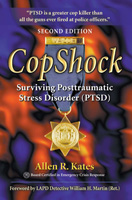
CopShock: Second Edition
Surviving Posttraumatic Stress Disorder (PTSD)
by Allen R. Kates, MFAW, BCECR
Depression
Trauma frequently causes depression, and depression is often associated with drinking, drug use and suicide. Depression is not officially listed by the American Psychiatric Association as a PTSD symptom, but it may precede PTSD, or occur at the same time as PTSD. Sometimes a person trying to cope with PTSD symptoms becomes depressed because it is difficult to stop the flashbacks, nightmares and fear. Seriously depressed people feel hopeless, bitter, irritable, restless and pessimistic. They don’t function well at work or in a social setting. They are withdrawn, and find little joy in life. They may have trouble sleeping, have no appetite and lose weight. Depressed people are often filled with guilt, shame and self-hatred, and often think about suicide.
Depression.com
This website, supported by
pharmaceutical company Glaxo-SmithKline, states that “depression is not
something you can just snap out of.” The site provides information on the causes
and treatment for depression. It describes the different types of depression,
and how to live with a depressed person.
Go to: http://www.depression.com.
Depression and Bipolar Support
Alliance (DBSA)
DBSA is the leading patient-directed national
organization focusing on the most prevalent mental illnesses. The organization
fosters an environment of understanding about the impact and management of these
life-threatening illnesses by providing up-to-date, scientifically-based tools
and information written in language the general public can understand. DBSA
supports research to promote more timely diagnosis, and develop more effective
and tolerable treatments.
DBSA’s prestigious 65-member Scientific Advisory
Board is comprised of the leading researchers and clinicians in the field of
mood disorders. DBSA has a grassroots network of nearly 1,000 patient-run
support groups across the country.
Go to: http://www.dbsalliance.org. Write:
Depression and Bipolar Support Alliance (DBSA), 730 N. Franklin Street, Suite
501, Chicago, Illinois 60610-7224. Toll free: (800) 826 -3632. If you are in
crisis, call 1-800-273-8255.
Depression Chat—Online
Support
DepressionChat.com provides a way for people
suffering from depression to speak to others with the same problems. You can
share experiences, treatment that has worked for you, and read the latest
information and news about dealing with depression.
Go to: http://www.depressionchat.com
Emotions Anonymous
(EA)
Emotions Anonymous is a twelve-step organization,
similar to Alcoholics Anonymous, and is composed of people who come together in
weekly meetings for the purpose of working toward recovery from emotional
difficulties such as depression, anger, grief, anxiety and so on.
Today
there are over 1000 EA chapters in 35 countries, including the United
States.
Go to: http://www.emotionsanonymous.org. Write: EA International, P.O. Box 4245, St. Paul, MN
55104-0245. Phone: 651-647-9712.